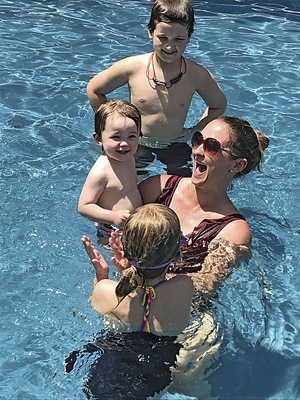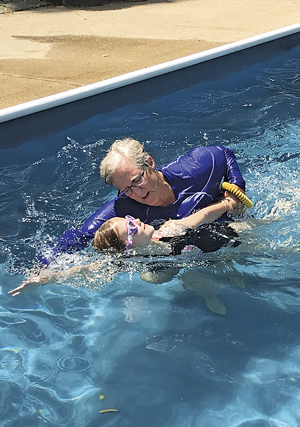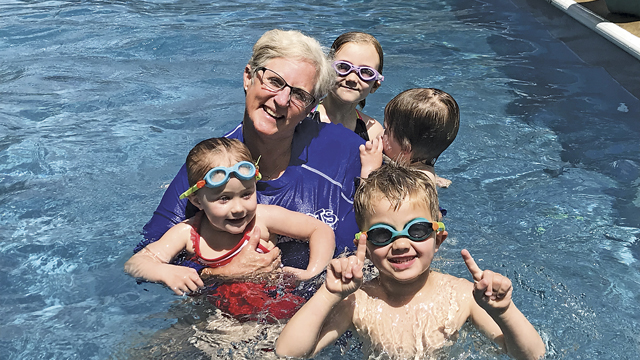All of us want to be effective parents, and all of us want to engage our children in activities that support our goals and intentions in raising them. With fifty years of teaching people to swim, I have found the process of learning to swim is one of the first and most effective tools to help parents guide their children in achieving the kind of confidence that leads to success both in and out of the water.
Here are eight important parenting strategies I’ve tapped into while teaching the life skill of swimming.
1. Rules are our friends; they keep us safe. Water is dangerous. Just like a highway is dangerous until a person is mature enough to be careful around it, children need strict boundaries around water. By creating rules, we also must train our children in the importance of obeying rules. Quite simply, rules keep us safe, and until our children mature and are able to take responsibility for their own safety in different environments, our rules are a loving way to limit their freedom for their own good.
2. Independence is earned. Parents would not consider allowing their young child to walk across the street by himself. By age six or seven, a child will have learned to look both ways, and after time spent practicing while being supervised, the child will have permission to cross alone. When a child is nine or ten, most parents wouldn’t worry about a street crossing because the child is mature enough to be responsible for his own safety. In the same way the child has earned the freedom to independently cross the street by becoming responsible for his own safety, a child earns the right to have free reign and independence in the water by learning to swim. This life lesson is important in many areas of life where independence is earned by being trustworthy with acquired skills.
3. Hard things are good things. For some children – no matter their ages – the process of learning to swim is hard. Kids can be anxious and fearful. For others, improving in skills is hard and may take months. This is life. In life, hard is not bad; it is just hard. Experiences like these are important opportunities to talk to our children about character traits, such as patience, persistence, diligence, and effort.

4. Courage is doing things that scare us. The incredible value gained from children facing fear and learning courage crosses over to countless areas of life before they grow and leave home. Whether it is riding a bike, giving a speech, learning to drive, initiating a conversation – any activity that might cause fear initially requires courage to overcome. Learning to swim often takes courage as increasingly difficult skills are learned and required in order for children to be confident and independent in the water.
5. Taking responsibility for skills learned is needed daily. Learning to swim is all about taking more and more responsibility for your own safety. Beginning with finding a source of air to swimming a stroke correctly, swimming is all about instructors handing over the mantle of responsibility to the students. This is a daily need between parents and their children. Responsibility for simple tasks, such as putting dirty clothes in a hamper to putting dishes by the sink or picking up toys, to more serious responsibilities – like homework, cooking a meal, or college applications – life is filled with parents transferring the burden of responsibility on to their children.
6. Practice makes better and closer to perfect. What parent would place her child in piano lessons once a week and never have her practice? Practice is what makes the education provided in the lesson stick, and continued practice builds the mental and muscle memory to naturally advance and take on added skill. School skills such as learning to read or mastering multiplication tables are no different, and the same is true in swimming, where time in the water is the best teacher for improvement. No one will be perfect, but improvement happens with practice.

7. Not everyone is the same, so celebrate personal growth. Don’t compare children. What a lesson this is – even for adults. I have four grandchildren who are six years old. We have one reading at a fourth-grade level, another who is athletic in everything, another who is a wiz at puzzles and Latin, and another who loves people and doesn’t have a shy bone in his body. They are all different and progressing on different timelines in different areas of life. We need to celebrate every child’s growth and encourage them to know that everyone is different and we are not going to be great at everything. We just need to try our best! This is seen in the timeline of progression in learning to swim all the time, and parents should celebrate growth and know that it is still growth of character – even when the skills are slow to be mastered.
8. True confidence grows by celebrating small successes. In the pool, I recently released a student from myself to the wall, which was about four feet away. As the student came up I looked at him and exclaimed, “You just swam all by yourself!” You could see his little chest puff up in as much disbelief that he had done it, as the knowledge that he had done it. He is not a swimmer yet, but he did it, and his confidence will help him improve with each lesson. This is so needed in life with our children, from toddler years to adulthood. Life is many more small steps toward a goal than huge leaps. We need to celebrate and be grateful for the journey of small celebrations that build our confidence and our desire to keep to the path that takes us on our journey.
Parents, as you work to be diligent and consistent in your parenting, remember that learning a skill such as swimming can not just save your child’s life, but it can help your child gain confidence in all areas of life, well into adulthood.
Photos: Emily and Ashlyn Morgan




